Introduction
Moringa (Moringa oleifera), often called the “miracle tree,” has been valued in traditional medicine for centuries. Rich in essential nutrients, it’s now gaining global recognition not just as a superfood, but as a potential ally in managing blood sugar and supporting healthy insulin levels.
Recent science-backed research suggests moringa may do more than simply boost overall nutrition — it could play a role in improving insulin sensitivity and maintaining balanced glucose levels. This has fueled its popularity, with many health brands offering moringa powder as a convenient way to enjoy its benefits.
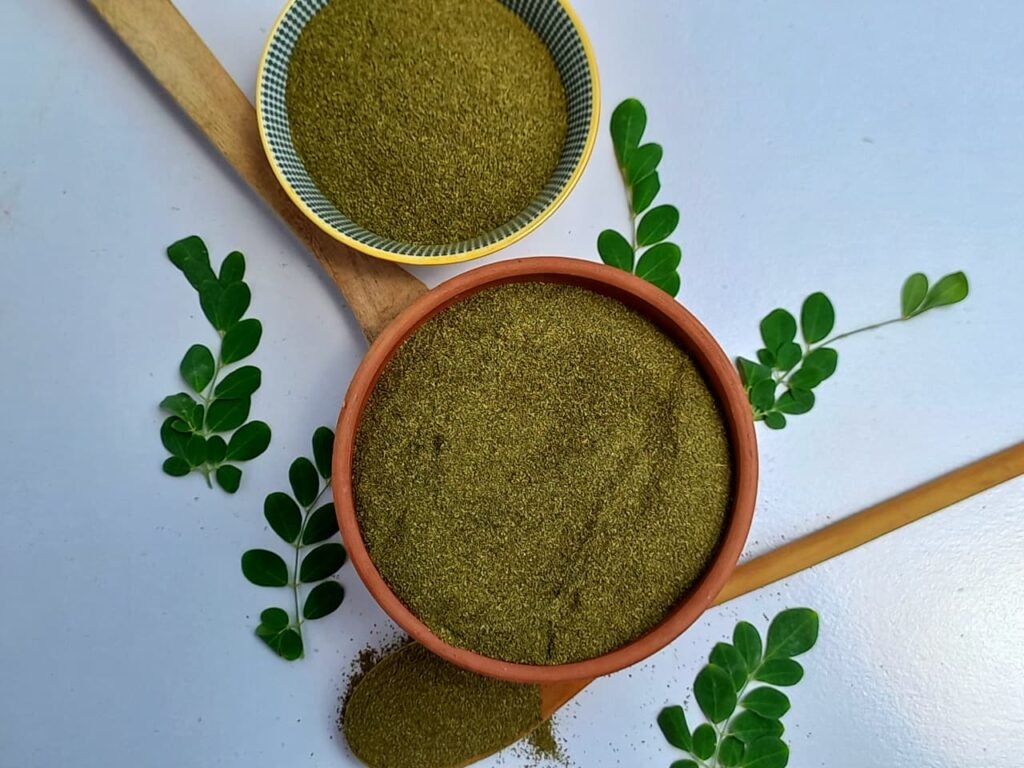
In this article, we’ll explore what moringa is, its key health benefits, and how it specifically impacts insulin and blood sugar regulation.
What is Moringa Powder?
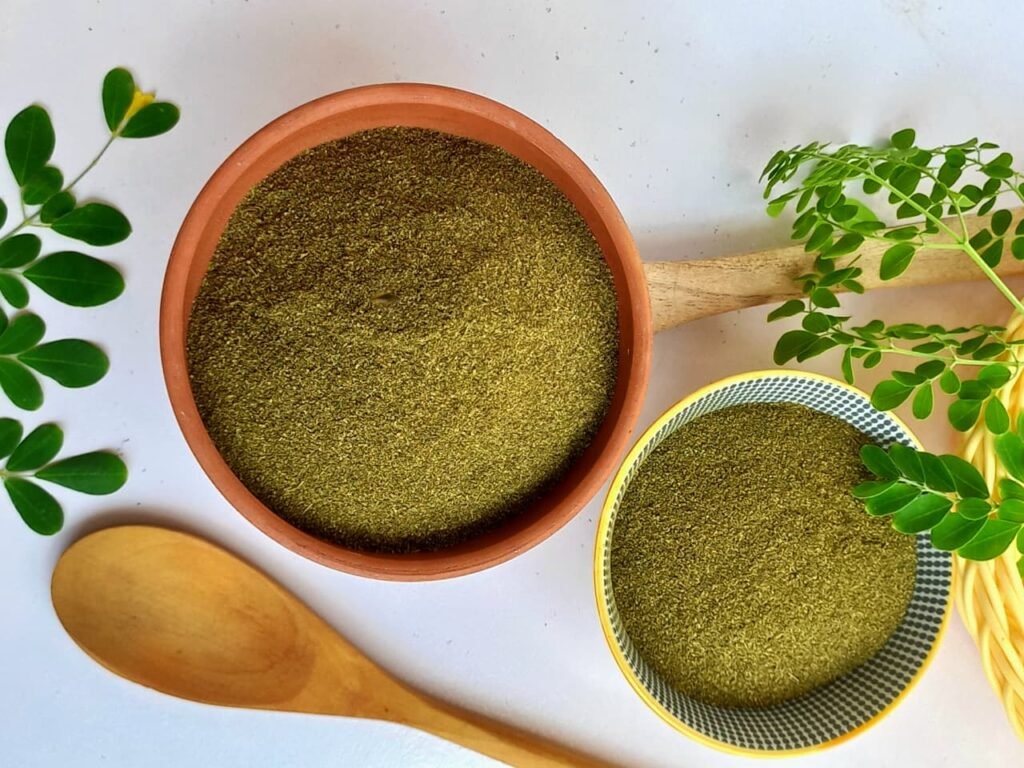
Moringa oleifera, widely known as moringa, is a tropical plant celebrated as both a nutritious food source and a traditional medicinal plant. Native to the sub-Himalayan regions of India, Pakistan, Bangladesh, and Afghanistan, it has been part of local diets and herbal remedies for centuries. Each region gives it its own name — for example, in Pakistan’s Punjab region, it is commonly called Suhanjana.
From an agricultural perspective, moringa is highly valued because it requires minimal water, soil nutrients, and care, making it ideal for cultivation in areas facing drought or water shortages. Almost every part of the plant is edible, including the bark, leaves, flowers, seeds, and fruits. However, its leaves are the most widely used because of their exceptional nutritional profile.
In recent years, moringa has gained global popularity as a superfood due to its potential benefits in:
Supporting healthy blood sugar levels
Aiding in weight management
Providing cancer-preventive properties
Improving overall wellness [1]
The leaves, in particular, are rich in:
Proteins and essential amino acids
Micronutrients like calcium, phosphorus, magnesium, potassium, zinc, copper, manganese, iron, and selenium
Healthy fatty acids and vitamin E
Dietary fiber for digestive support[2]
This nutrient density explains why moringa powder, made by drying and grinding its leaves, has become a sought-after natural supplement worldwide.
Merged Moringa Mineral Content with Health Benefits
| Mineral | Reported Range | Health Benefits |
| Calcium | 281.0 – 808 mg/kg | Supports bone health, muscle contraction, and nerve signaling. |
| Potassium | 1.50% (15,000 mg/kg) | Regulates fluid balance, nerve signals, and muscle contractions. |
| Manganese | 1.21 – 86.8 mg/kg | Important for bone formation, enzyme function, and metabolism. |
| Iron | 5.18 – 490 mg/kg | Essential for hemoglobin production and oxygen transport. |
| Selenium | 363 mg/kg | Acts as an antioxidant, supports thyroid function, and boosts immunity. |
| Protein | 27.1 g/100g | Builds and repairs tissues, enzymes, and hormones. |
| Zinc | 0.65 – 31.03 mg/kg | Boosts immunity, aids wound healing, and supports growth. |
| Phosphorus | 0.30% (3,000 mg/kg) | Helps with bone health, energy production, and DNA repair. |
| Boron | 49.93 mg/kg | Supports bone health, brain function, and cell membrane integrity. |
| Copper | 8.25 mg/kg | Helps form red blood cells, supports immune function, and aids in iron metabolism. |
| Magnesium | 63.08 – 97.28 mg/kg | Supports muscle and nerve function, blood pressure regulation, and energy production. |
📌 Important Note:
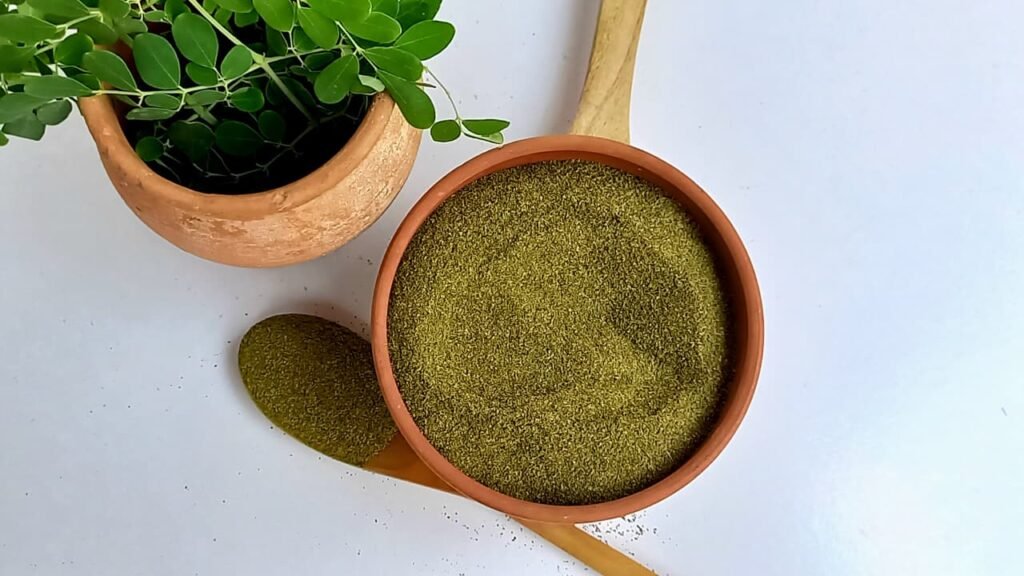
The nutritional content and density of moringa powder can vary greatly between different studies and sources. This variation happens because nutrient levels depend on factors such as:
🌱 Geographical location & soil quality — The country or region of cultivation and the mineral content of the soil affect nutrient uptake.
🌤 Climate & seasonal changes — Temperature, rainfall, drought, and sunlight influence nutrient density.
🥬 Plant maturity — Young leaves may have higher nutrient content compared to mature leaves.
🛠 Processing methods — Fresh, dried, or powdered leaves can retain nutrients differently.
🔬 Laboratory analysis methods — Different testing techniques may produce slightly different values.
Some Amazing Facts About Moringa 🌿✨
Based on scientific studies and nutritional comparisons, moringa is a true superfood:
- 🥛 Calcium powerhouse – Contains up to 10 times more calcium than milk.
- 🍌 Potassium-rich – Holds about 4 times more potassium than bananas.
- 💉 Iron booster – Its high iron content makes it useful in treating anemia.
- 🥩 More iron than meat – Has over 92% more iron than beef.
- 🌱 Greener than spinach – Contains more iron than spinach.
- 🥛 Protein advantage – Delivers 2 times more protein than milk.
General Health Benefits of Moringa
Before diving into its role in insulin regulation, let’s explore some of the science-backed general health benefits of moringa:
- Skincare and Anti-Aging
Moringa oil is a popular ingredient in skincare products for its anti-aging and anti-acne properties.
It nourishes the skin, reduces fine lines, and combats breakouts naturally.
- Energy Boost and Digestion Support
Nutrient-dense leaves provide a natural energy boost without caffeine.
Supports digestion, reduces acidity, and eases inflammation.
Rich in magnesium, it promotes muscle relaxation and gut health.
- Powerful Antioxidant & Anti-inflammatory Effects
Packed with antioxidants, phytochemicals, and healthy fats that help protect the body from:
Cancer and osteoporosis
Oxidative stress and chronic inflammation
Bacterial and viral infections
Cardiovascular diseases and metabolic disorders (including obesity, diabetes, and dyslipidemia)
- Blood Sugar & Metabolic Health
May increase insulin sensitivity, improve glucose and lipid metabolism, and regulate liver enzyme function.
Can help in managing PCOD and supporting overall hormonal balance.
- Brain and Nerve Protection
Neuroprotective properties from antioxidants and anti-inflammatory compounds may help in managing Alzheimer’s and Parkinson’s disease.
Supports working memory and cognitive function, preserving quality of life.
- Natural Sleep Support
Moringa seed oil contains kaempferol, a bioactive compound that helps regulate the sleep–wake cycle without the side effects of sleep medications.
- Digestive and Ulcer Protection
Its anti-inflammatory properties can protect against ulcers and soothe gastrointestinal discomfort.
- Wound Healing & Immunity
Antimicrobial and anti-inflammatory compounds aid in faster wound healing and help strengthen immune defenses.
- Bone Health
May help control osteoporosis by slowing bone loss and promoting new bone growth. [4]
Moringa and Insulin: The Science of How It Works
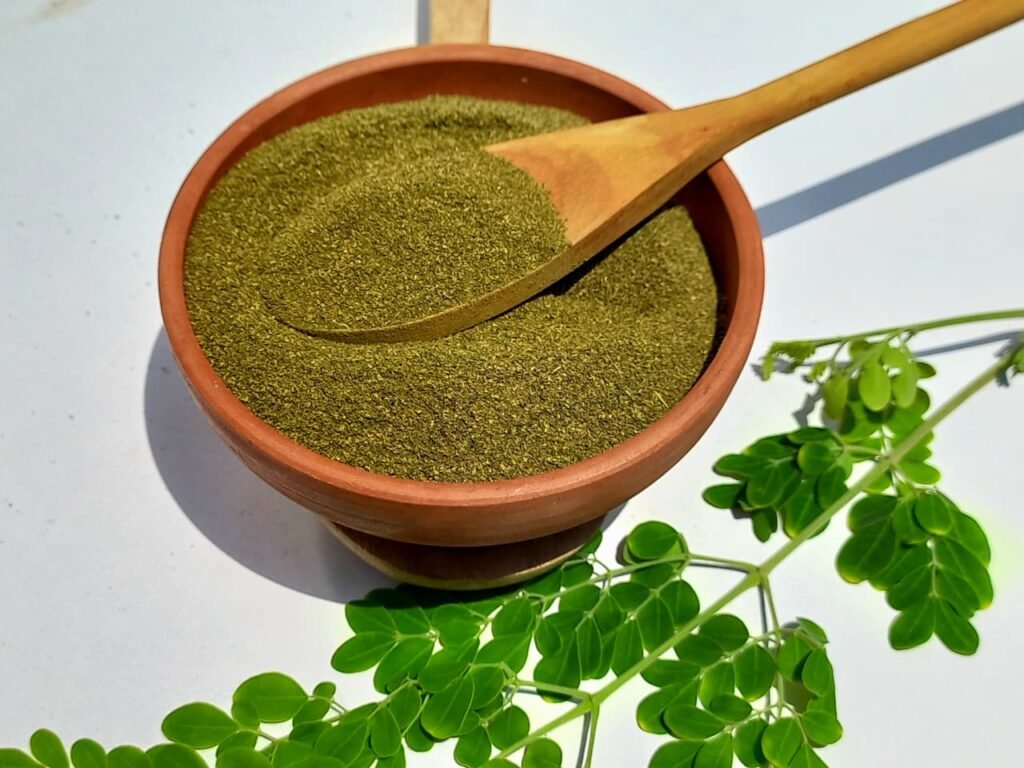
Insulin is the hormone that keeps blood sugar under control. When the body cannot produce enough insulin, or when cells stop responding to it (insulin resistance), the result is conditions like Type 2 Diabetes and PCOS. High blood sugar doesn’t just stay in the blood — it creates harmful molecules called reactive oxygen species (ROS), which trigger oxidative stress and inflammation. Together, these processes damage organs like the liver, disrupt hormones, and make insulin resistance even worse.
This is where moringa comes in. Scientific studies have shown that its unique blend of bioactive compounds — including quercetin, chlorogenic acid, kaempferol, and isothiocyanates — can directly improve insulin sensitivity and glucose control.
Here’s how It works:
- 🌱 Slows sugar absorption in the gut: Quercetin and chlorogenic acid act on glucose transporters in the intestines, reducing the speed at which sugar enters the bloodstream.
- 💪 Helps cells absorb sugar better: These compounds activate AMPK (the body’s “energy switch”) and GLUT4 transporters in muscles, pulling glucose into cells for energy.
- 🩸 Protects the pancreas: Antioxidants shield insulin-producing beta cells from oxidative stress, helping them release insulin more effectively.
- 🔥 Reduces inflammation and oxidative stress: Moringa lowers inflammatory cytokines and neutralizes ROS, breaking the vicious cycle that fuels insulin resistance.
- 🛡 Prevents long-term damage: By reducing the formation of advanced glycation end products (AGEs), moringa protects organs like the eyes, kidneys, and nerves from diabetic complications.
- ⚖️ Improves fat and sugar metabolism: Through regulation of PPAR pathways, moringa helps balance cholesterol, triglycerides, and overall energy metabolism.
In women with PCOS, these effects are particularly important: by improving insulin sensitivity and reducing oxidative stress, moringa can also lower androgen levels and support healthy follicle development — key steps for hormonal balance and fertility.
👉 In short, moringa works on multiple levels: it slows sugar absorption, makes cells respond better to insulin, protects vital organs, and reduces inflammation. This multi-targeted action is why researchers consider moringa such a promising natural aid in managing diabetes, PCOS, and metabolic disorders.[5,6,7]
How to Use Moringa Powder for Insulin Support (Dosage & Practical Tips)
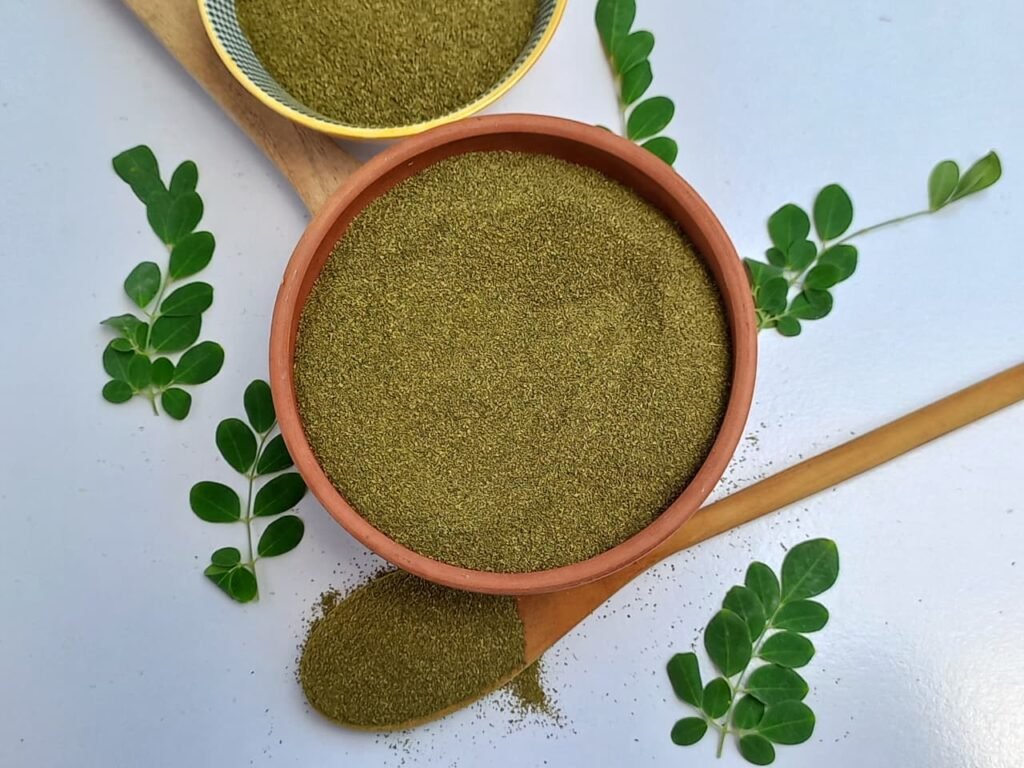
One of the most common questions people ask is: “How much moringa powder should I take for blood sugar support?” The truth is, research on humans is still limited, and most studies have used different doses, forms (powder, capsules, extracts), and durations. However, here’s what current evidence suggests:
📊 Human studies:
In one study with postmenopausal women, participants consumed 7 grams of moringa leaf powder daily for 3 months, showing improvements in blood sugar.
Other studies in people with type 2 diabetes used lower doses (500 mg – 4 g daily) but results were inconsistent, partly because of short duration or differences in preparation.
🐀 Animal studies:
Doses ranged from 50 mg/kg to 700 mg/kg of body weight, which often translated into more dramatic effects than seen in human studies.[7]
✅ Safety profile:
Across both animal and human research, moringa leaf powder appears to be safe in doses ranging from 500 mg up to 7 g per day.
The main limitation In human trials has been taste acceptability, as the powder can be bitter or earthy when added to food.
Practical Tips for Using Moringa Powder
Start small: Begin with ½ teaspoon (1–2 g) daily to allow your body to adjust.
Work up gradually: Increase to 1–2 teaspoons (3–6 g) daily if tolerated.
Maximum tested dose: Studies have safely used up to 7 g daily, but it’s better to build up slowly.
Best timing: Take it with meals, as it may help slow glucose absorption and reduce post-meal sugar spikes.
Easy ways to add it:
Blend into smoothies or shakes
Sprinkle over salads or soups
Mix into yogurt or oatmeal
Brew as a herbal tea
Important Note
Moringa powder is a supportive supplement, not a substitute for medical treatment. If you are already taking antidiabetic or hormonal medications, consult your doctor before starting, as moringa may enhance their effects and lower blood sugar further.
Precautions When Taking Moringa
Moringa is safe for most healthy adults when consumed in moderation, but there are some situations where caution is necessary.
⚠️ Who Should Be Cautious?
🤰 Pregnancy & breastfeeding → Avoid moringa during this time. Certain plant parts may trigger uterine contractions, and research on safety for mothers and babies is still limited.
💊 People on medications → Moringa may interact with diabetes medicines (blood sugar–lowering) and liver-processed drugs. Always consult your doctor if you’re on medication.
🌿 Safe vs. Unsafe Plant Parts
✅ Safe to consume → Leaves, seeds, and pods (these are used in most moringa powders and supplements).
❌ Avoid → Roots and bark, as they may contain potentially toxic compounds.
🚨 Possible Side Effects
Rare cases of allergic reactions (e.g., facial swelling, difficulty breathing).
Digestive upset (nausea, diarrhea, or stomach cramps), especially if taken in high doses.
📏 Dosage Tips
Stick to the recommended serving size on product labels.
More is not always better — excessive intake can increase the risk of side effects.
✅ Quick Takeaway:
Moringa is a powerful superfood, but not for everyone. If you’re pregnant, breastfeeding, taking medications, or have a chronic condition, talk to your healthcare provider before adding it to your diet. For most people, moderate consumption of leaf powder or seed-based products is safe and beneficial.
Final Takeaway
Moringa powder is more than just a trending superfood — it’s a nutrient powerhouse with real potential to support insulin sensitivity, blood sugar balance, and overall health. Rich in antioxidants, vitamins, minerals, and bioactive compounds, moringa works on multiple levels: it helps reduce inflammation, protects vital organs, and makes the body respond better to insulin.
While its benefits are promising, it’s important to remember that moringa is not a standalone cure for diabetes or hormonal conditions. Instead, it can be a valuable addition to a balanced lifestyle, alongside healthy eating, regular exercise, and professional medical care.
Used wisely and in moderation, moringa can be a natural ally for improving energy, hormonal balance, and long-term wellness — truly living up to its name as the “miracle tree.” 🌿